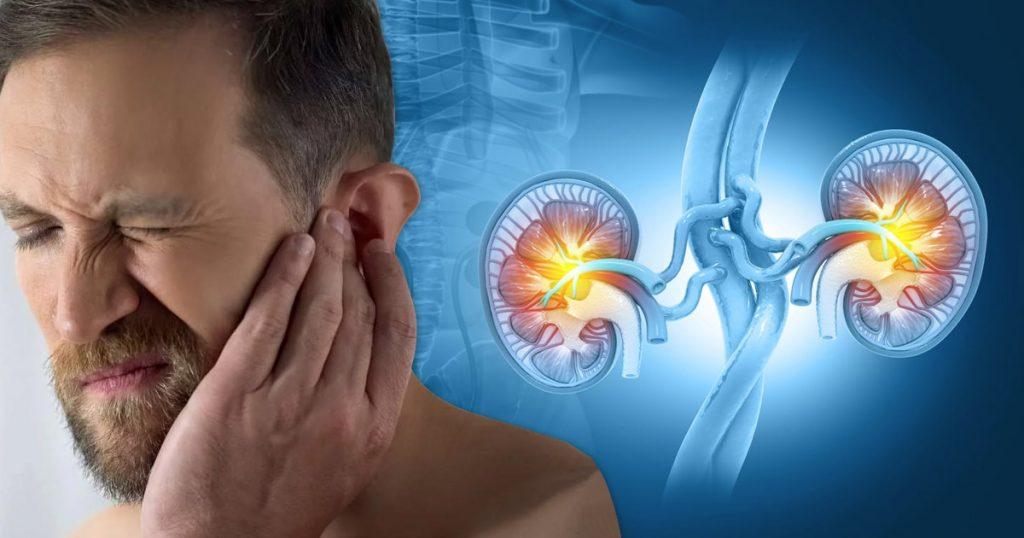Taking care of your kidneys is important for staying healthy. These organs help clean waste and extra fluids from your blood, keep your body’s salts balanced, and control your blood pressure. Even though kidneys are so crucial, many people don’t think about them until there’s a problem.
Kidney disease can happen because of things like diabetes, high blood pressure, and poor lifestyle choices. If you ignore these issues, it can lead to serious health problems. When kidneys don’t work well, it can also harm other parts of the body, like your heart, bones, and, surprisingly, your ears. It may be unexpected, but kidney problems can sometimes lead to hearing loss, showing how all parts of our body are connected.
The Surprising Connection Between Kidneys and Hearing
You might be surprised to learn that your kidneys and your ability to hear are linked. Though they seem unrelated, kidneys and ears share some interesting connections. Both have similar types of tissue, which means they can be affected by similar health issues. When kidneys aren’t working well, they may not filter out toxins from the blood effectively. These toxins can then reach and harm the delicate parts of the inner ear, which can affect hearing.
Additionally, certain medications used to treat kidney problems, known as ototoxic drugs, can sometimes damage the inner ear. These drugs are important for managing kidney disease, but they can have side effects like hearing loss or balance issues. So, when your kidneys have problems, it might also lead to ear issues.
Recognizing the Signs: Kidney Disease and Hearing Loss
It’s important to know the signs that your kidneys might be affecting your hearing. Often, people don’t think hearing problems could be linked to kidney issues, but spotting these signs early can help you get the right treatment.
Here are some symptoms to watch for:
- Tinnitus: This is when you hear ringing or buzzing in your ears, even when there’s no sound around. It might be a clue that your kidneys are affecting your ears.
- Difficulty Hearing: If you find it hard to hear, especially in places with a lot of background noise, your kidneys might be involved. Toxins or medications related to kidney problems can impact how well you hear.
- Balance Problems: Your inner ear helps you stay balanced. If you’re feeling dizzy or unsteady, it could mean your kidneys are interfering with your ear’s ability to function properly.
Being aware of these signs and seeing a healthcare professional early can help manage these problems better.
Treatment Options for Kidney-Related Hearing Issues
If you’ve noticed signs that your kidneys might be affecting your hearing, it’s important to take action. Here’s a straightforward look at the treatment options you can consider:
1. Medical Treatments
Managing kidney disease with medication can help reduce its effects on hearing. Doctors might suggest medications like ACE inhibitors or ARBs, which help protect your kidneys and manage blood pressure. Diuretics can also help by reducing excess fluid in the body, potentially easing ear pressure. Regular check-ups with blood and urine tests are crucial to keep track of how well your kidneys are working and to adjust medications as needed.
2. Lifestyle Changes
Making some changes in your daily routine can help both your kidneys and hearing. Eating a healthy diet with lots of fruits, vegetables, whole grains, and lean proteins, while cutting down on salt and sugar, can make a big difference.
It’s also important to drink plenty of water—about 8 glasses a day unless your doctor advises differently. Adding regular exercise like walking, swimming, or yoga can improve your blood flow and overall health. Avoid smoking and limit alcohol to protect your kidneys and hearing further.
3. Hearing Aids and Therapies
If kidney issues have led to hearing loss, hearing aids can be very helpful. There are various types, like behind-the-ear aids and in-ear aids, each suited to different needs. Speech therapy can also assist you in adjusting to changes in hearing, helping improve clarity and listening skills, which makes daily communication easier.
4. Regular Monitoring and Early Detection
Keeping up with regular doctor visits can help spot any changes in your kidneys or hearing early on. Hearing tests, known as audiograms, can check your hearing levels, while kidney function is monitored with blood tests like creatinine and GFR. Catching changes early allows for timely treatment adjustments, preventing further issues.
Working closely with healthcare professionals ensures you get the right support for both your kidneys and hearing. Starting these treatments early can really improve your quality of life.
Kidney Health and Lifestyle Changes
Taking good care of your kidneys is important, and if you think you’re not doing enough, now’s the time to make some changes. Start by cutting down on salt, which can ease the pressure on your kidneys and help control your blood pressure. Drinking enough water keeps your kidneys working well by flushing out harmful substances. Also, try to avoid smoking and drink less alcohol to prevent kidney damage.
These simple changes won’t just help your kidneys—they can also improve your hearing, heart health, and overall wellness. You will experience numerous advantages and an overall improvement in your well-being by embracing healthier habits. Begin today for a healthier future. Your body will really appreciate it!
